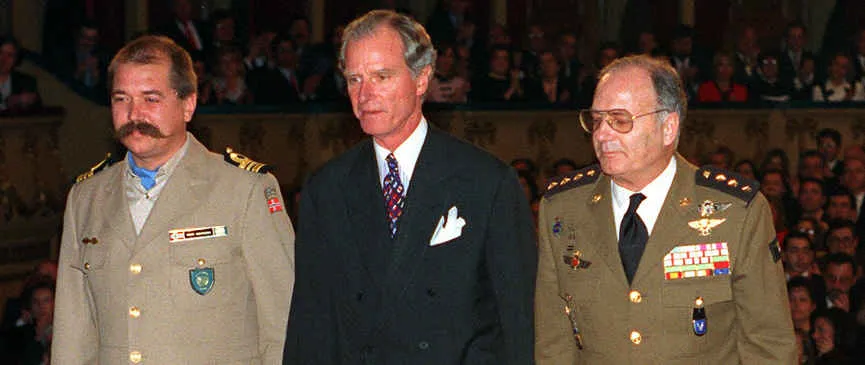Main content
United Nations Blue Berets Stationed in Ex-Yugoslavia Prince of Asturias Award for International Cooperation 1993

Speech made on behalf of Mr. Boutros -Ghali,
United Nations Secretary-General, by Mr. Joseph Verner Reed, Special Representative
Your Majesty,
Excellencies,
Ladies and Gentlemen,
I greatly regret that the pressure of international events has made it impossible for me to travel personally to Oviedo today as you honour the 28,200 military, civilian, and police staff of the United Nations Protection Force. I have therefore asked Ambassador Joseph Verner Reed, my Special Representative for Public Affairs, to make this short statement on my behalf. I understand that you will also be joined by eight UNPROFOR members, representing the troops, military observers, civilian police monitors and civilian staff of UNPROFOR members, representing the troops, military observers, civilian police monitors and civilian staff of UNPROFOR
The jury has singled out the United Nations Protections Force for this award in recognition of the humanitarian work being carried out by UNPROFOR troops 'within a extremely complex situation whose outcome it is impossible to predict' and their 'outstanding contribution to achieving a peaceful solution to the military conflict'.
The members of UNPROFOR are deeply grateful to the Prince of Asturias Foundation for honouring them in this way. As Secretary-General of the United Nations, I can say that this is an honour which the men and women of UNPROFOR richly deserve. I also know that United Nations peacekeepers everywhere will be delighted that recognition has been given to their colleagues in this way. All of the United Nations can take pride in the honour you are doing to UNPROFOR.
Let us remember in particular today the 62 members of UNPROFOR and then humanitarian workers who have lost their lives since the mission was established in February 1992. Our thoughts go also to 782 who have been injured in the course of duty in the former Yugoslavia.
By recognising the difficulties under which UNPROFOR is operating, and by acknowledging the extreme complexity of the political situation in the former Yugoslavia, the Prince of Asturias Foundation has sent a clear message of encouragement to all those engaged in the eighteen United Nations peace-keeping operations around the world. As the United Nations embarks on a second generation of peace-keeping, and when the organisation is entering new and uncharted territory, it is deeply gratifying for the women and men who risk life and limb for the sake of their fellow human beings to be recognised in this way.
The maintenance of international peace and security is one of the key aims of the United Nations. 35 countries are pursuing this goal by contributing to UNPROFOR. I pay tribute to all of them. But today special mention must be made of the distinguished contribution made to UNPROFOR by the armed forces of Spain. Their role was specifically - and rightly - cited by the jury.
The Security Council has, during the past two years, given an ever-increasing number of tasks to UNPROFOR. Despite this helping hand from the international community, the warring parties on the ground have not so far resolved their differences.
Because of a lack of co-operation - sometimes amounting to downright hostility - from the parties, UNPROFOR has not been as effective as it might have been. Despite these difficulties, however UNPROFOR and the humanitarian agencies of the United Nations have been untiring in their efforts to alleviate the suffering of the civilian population, whose livelihoods and hope have been shattered by violence.
The men and women engaged in this work deserve our unflinching support and admiration. As winter approaches, they again face an uphill struggle. 2.7 million lives are at risk in Bosnia and Herzegovina alone. People are exposed to cold, hunger and disease. In these circumstances, their only hopes lie in the arrival of a humanitarian assistance convoy. These convoys have to struggle their way over snow-covered mountainous roads and through battle zones.
The patience, persistence and diplomatic skill of the men and women operating these convoys is taxed to the maximum when they are stopped heartlessly at road blocks by one or other of the warring factions. They know that if they do no prevail, the needy people on the other side of the roadblock will have to face further starvation and despair.
The people of the former Yugoslavia want peace. I take this opportunity, therefore, to call upon their military and political leaders to exercise their responsibility to their peoples and to the international community. They should act decisively to set a course towards relief from the horrors of war, and the reestablishment of peace.
End of main content
